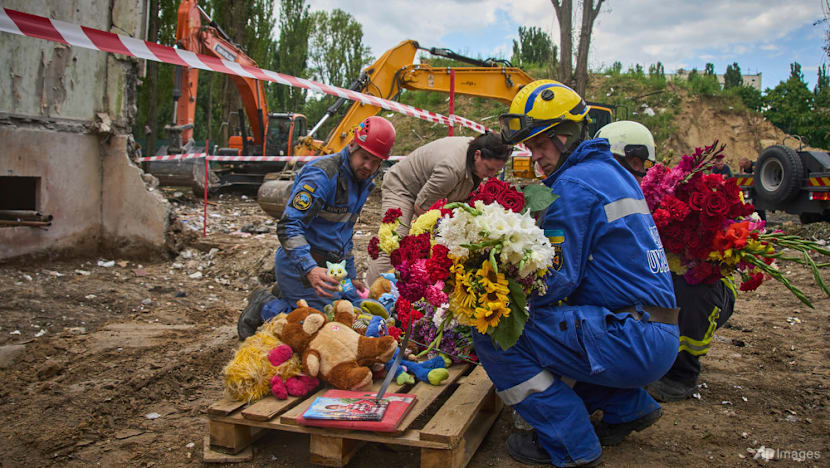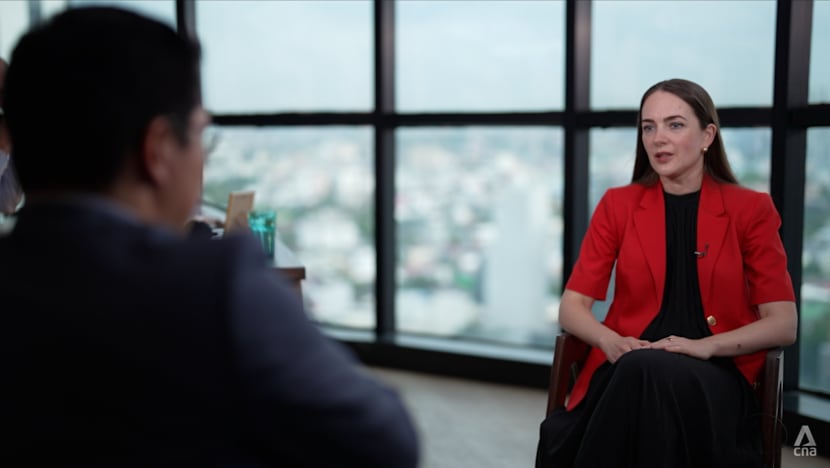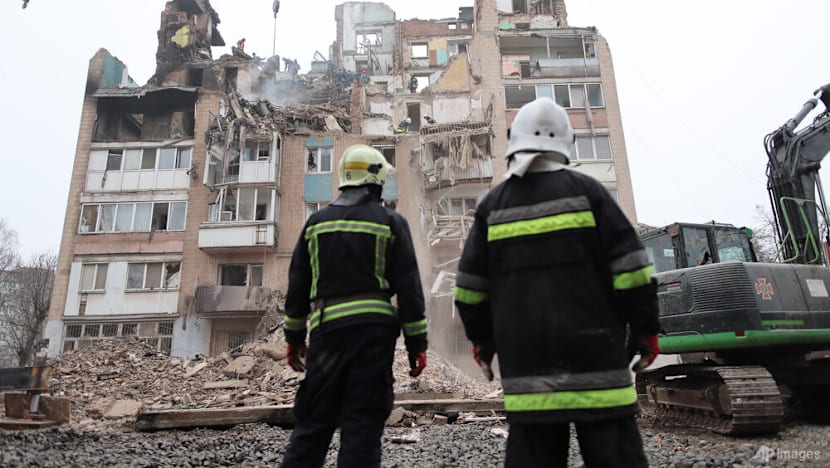‘You can’t be neutral to human suffering’: Ukrainian Nobel peace laureate urges global action on Russia’s war
Life in Ukraine remains marked by uncertainty, loss and resilience, said Oleksandra Matviichuk in an interview with CNA.

Rescuers place toys and flowers on the site of a missile strike by Russia that hit a residential house killing 31 civilians including five children in Kyiv, Ukraine, Aug 1, 2025. (Photo: AP/Efrem Lukatsky)

This audio is generated by an AI tool.
BANGKOK: As Russia’s full-scale invasion of Ukraine nears its fourth year, governments that have remained neutral should consider the human cost of the conflict, said Ukrainian human rights defender and lawyer Oleksandra Matviichuk.
“I strongly believe that you can't be neutral to human suffering. You can't be neutral to (the) violation of international law, which protects you as well,” she added.
She noted that Russia, as one of five permanent members of the United Nations Security Council, has veto power to stop the adoption of any UN resolution, regardless of the level of international support.
“Russia can block any decision which it doesn’t like. Russia has a population of (about) 140 million, so in comparison with Ukraine, Russia is much stronger,” said Matviichuk.
“When you say that you are neutral, you are not neutral - because in this situation, if you don't help Ukraine to resist, it means that you just help Russia to occupy Ukraine.”
The 42-year-old, who is head of the Center for Civil Liberties – a Kyiv-based human rights organisation that was awarded the Nobel Peace Prize in 2022 – was speaking to CNA during a recent trip to Bangkok.
Life in Ukraine remains marked by uncertainty, loss and resilience, said Matviichuk, stressing the need for international accountability.
ACCOUNTABILITY GAP
Matviichuk had in 2023 called for the creation of a special tribunal to prosecute leaders in Moscow - including Russian President Vladimir Putin - for the crime of aggression, the invasion of or attempt to gain control over another sovereign state.
Later that year, the International Criminal Court (ICC) issued an arrest warrant for Putin for the war crime of abducting Ukrainian children and transporting them to Russia.
He has so far evaded it despite trips to countries like Mongolia and Tajikistan, which are ICC members and thus obligated to cooperate with the court, including by arresting and surrendering any suspects who enter their territories.
Matviichuk said current legal mechanisms fall short of holding leaders accountable.
"There is a huge accountability gap which exists in international law for the current moment. There is no international court which can prosecute Putin and top political leadership in high military command for the crime of aggression,” she added.
“Even the ICC has no such jurisdiction in … the Russian war of aggression against Ukraine. It can prosecute Putin for war crimes like the illegal trafficking of Ukrainian children, for crimes against humanity, for genocide - but not for the crime of aggression.”
She reiterated her call for a special tribunal, adding that her organisation has been documenting atrocities committed by Russia in Ukraine.
Holding perpetrators accountable is not only about justice for Ukraine but also about deterring future wars, she said.
“It sounds like common sense, because if Putin will be rewarded for this aggressive war, it will encourage other authoritarian leaders in different parts of the globe to do the same - to invade another country, to kill people there, to erode their identity, to steal their children and forcibly changed internationally recognised borders,” Matviichuk added.
WHY THE WAR MATTERS TO ASIA
Matviichuk was in Thailand as part of an Asian tour that also took her to the Philippines and Taiwan.
In Bangkok, she was the keynote speaker at a forum held at the Institute of Security and International Studies, which focused on the implications of the war on Southeast Asia and East Asia.
On why Asians should care about what is going on in Ukraine, Matviichuk said that although the two regions are geographically distant, they are “very close when it comes to very simple human things”.
“We are fighting for the freedom of not being a Russian colony, but to be an independent state … These are understandable things for people, regardless where they live,” she noted.
She added that the war is not just between two states, as Putin is attempting to prove that a nation “with strong military potential and nuclear weapons can do whatever they want”.
“In this war, we are fighting not just for ourselves. We are fighting for this existing world order to make the lives of everyone safer.”

LIVING IN “TOTAL UNCERTAINTY”
When asked how Ukrainians are coping nearly four years since Russia launched its full-scale invasion on Feb 24, 2022, Matviichuk described a life of disrupted normalcy and constant fear.
“You live in total uncertainty. You can't plan not just your day - you can't plan your next several hours. You have no idea what will happen,” she said.
The possibility of leading a normal life, like going to work or having family dinners, has been “disappeared and crushed”, she added.

According to the UN Human Rights Monitoring Mission in Ukraine, at least 13,800 civilians in Ukraine have been killed since the war escalated, with more than 35,000 injured.
At least 6.9 million Ukrainians have fled the country since then, according to the UN’s refugee agency.
Russia first invaded Ukraine in 2014 when it annexed the Crimean Peninsula. Matviichuk said that over the next eight years, Moscow forcibly recruited Ukrainian men from occupied territories before escalating the conflict.
“Russia is an empire, and empires have a center but no borders. An empire always tries to expand,” she added.
Despite the suffering, Matviichuk said she continues to draw hope from the resilience of ordinary Ukrainians.
"I found myself in (a) situation when the law doesn't work. The entire UN system of peace and security can't stop Russian atrocities, and this war is very cruel. Millions of people in Ukraine are suffering. We all lost someone - me also,” she added.
“But millions of people in Ukraine said we will resist. We will fight for the slightest chance for our children to live without fear of violence and to have a long-term perspective.”
Ordinary people fighting for their freedom and human dignity, Matviichuk said, have proved stronger than Russian troops.
“I think that we have to define hope properly. Hope - it's not a confidence that everything will be fine. Hope is a deep understanding that all our efforts have a huge meaning,” she added.



















